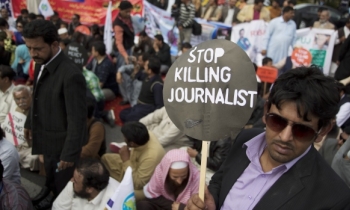Public awareness of the number of American military fatalities in Iraq has declined sharply since last August. Today, just 28 per cent of adults are able to say that approximately 4,000 Americans have died in the Iraq war. As of March 10, the Department of Defence had confirmed the deaths of 3,974 US military personnel in Iraq.
In August 2007, 54 per cent correctly identified the fatality level at that time (about 3,500 deaths). In previous polls going back to the spring of 2004, about half of respondents could correctly estimate the number of U.S. fatalities around the time of the survey.
In the latest poll by the Pew Research Centre for the People & the Press, more respondents underestimated than overestimated the number of fatalities. A plurality of 35 per cent said that there have been about 3,000 troop deaths, and another 11 per cent said there have been 2,000 deaths. Just under a quarter (23 per cent) said the number of fatalities is closer to 5,000.
The drop in awareness comes as press attention to the war has waned. According to the News Content Index conducted by the Project for Excellence in Journalism (PEJ), the percentage of news stories devoted to the war has sharply declined since last year, dropping from an average of 15 per cent of the newshole in July to just 3 per cent in February.
As news coverage of the war has diminished, so too has public interest in news about Iraq. According to Pew's News Interest Index survey, Iraq was the public's most closely followed news story in all but five weeks during the first half of 2007; however, it was a much less dominant story between July 2007 and February 2008. Notably, the Iraq war has not been the public's top weekly story since mid-October.
Along with declining interest in news about Iraq, a Pew poll last month found a significant increase in the number of Americans who believe that military progress is being made in Iraq. However, the public remains divided about when to remove troops and a majority continues to say that the war was the wrong decision.
The current Pew News IQ survey provides an updated look at the public's knowledge of political and world affairs. A total of 1,003 adults were interviewed from February 28 to March 2 and asked to answer a series of 12 multiple choice questions. The margin of error for the poll is plus or minus 3.5 percentage points.
The percentage able to name the Sunnis as the branch of Islam competing for control of Iraq with the Shiites was 62 per cent, five points lower than in August and the same percentage as in March 2007. A majority of Americans (56 per cent) also knew that John McCain represents Arizona. Half were able to identify Hugo Chavez as the President of Venezuela, while fewer than half (46 per cent) were aware that Kosovo declared its independence from Serbia.
The toughest question on the survey asked respondents to choose the current Senate majority leader from a list of four men. Fewer than one-in-four (24 per cent) could identify Harry Reid as the Senate leader.
On average, respondents could correctly answer approximately six out of twelve questions (mean 5.97; median 6.0). There were substantial differences in knowledge levels across demographic groups. Men could correctly answer an average of 6.7 of the 12 questions; women could answer an average of 5.3 questions. College graduates could correctly answer an average of nearly three more questions than could respondents with no college experience (7.4 vs. 4.5). And respondents 50 and older could correctly answer an average of about two more questions than those under age 30 (6.7 vs. 4.6).









